Izyum is Ukraine
I travelled with volunteers from the Myrne Nebo charity to visit their volunteer kitchen and bakery in Izyum, Kharkiv region. They make hot food and bread every day for people in need.
The road from Kharkiv to Izyum is shaded olive green: in one direction, the Kupyansk front, in the other, the route through Donetsk oblast. Stop at a petrol station to buy coffee and the other customers are all soldiers, military trucks and tank transporters rumble past in the other lane. Everywhere there are the signs of Russia's destruction: houses pockmarked with shrapnel, mangled bus stops, a wooden bridge across the river next to one that's been completely destroyed. On the edge of town, more burned out homes and a block of flats riven in two by a Russian airstrike, a huge gaping V shaped gash through the middle, where people had gathered together to keep warm. Hundreds of people were killed here during those dark months of occupation, many of them buried in mass graves discovered after liberation. Nothing will bring back those lives cut short, but thousands of residents have returned to Izyum, despite the lack of facilities and the huge scale of damage - determined to carry on living in their own homes.
Destroyed flats in Izyum
We drove towards the town centre, where last September President Zelenskyy raised the Ukrainian flag, shortly after it was liberated. The town council building has bene left badly damaged but there were freshly planted flowers at the front and a sign declaring 'I love Izyum'. On a building opposite, its window frames blackened and burned out, the well known LBWS graffiti artist had drawn a mural supporting the rebuilding charity Dobrobat. We drove on, towards a building leased by the charity Myrne Nebo housing a kitchen and small bakery area, with a large basement to store produce underneath.
Inside we were met by Jana Matveeva, who's in charge of the operation there, while another volunteer Mykola translated for me. The bakery only has one oven and a single dough mixer, which the volunteers have been using so much it frequently breaks down. "It's so old, but it continues to work and helps out bakers to make fresh bread and support all the people in need", Mykola tells me. Most of the people working here are volunteers as there are few jobs in the deoccupied territories as there aren't very many businesses there which are still open. There were 70,000 people living in Izyum before the full scale war, now only around 23,000 have managed to stay. But that's still a lot more than during the dark days of occupation.
The wonderful volunteer bakers
The bread they make gets delivered around Izyum city and the nearest villages as it's impossible to buy fresh bread there. "there are no other bakeries here, nowhere else exists around Izyum, if you can find bread it's been delivered from Kharkiv", Jana says.
She led me down some rickety steps into the dark, chilly cellar where huge sacks of vegetables are being stored: there are potatoes, onions, piles of cabbages. Jana tells me how people lived down there during the heavy fighting last autumn - it is spooky and dank and hard to imagine how horrible it must have been to spend days and nights hiding there while all kinds of horror was raging in the streets above.
They make delicious hot food too
Back in the kitchen, the generator was working hard to keep the stoves and fridges going: there were huge pots of soup cooking away, and a lady was stirring a vast tray of what looked like kasha. Hot meals were being packed into large containers ready for delivery: there was stew and potatoes and fresh salads, and of course - loaves of bread. Jana insisted we stay for lunch, and led us through to a table laid with platters of chicken, tomato salad, pickled cabbage and enough potatoes to feed a small crowd.
Such an honour to be invited to lunch
Next stop was a children's centre which Myrne Nebo also supports: there are no schools working anywhere in the deoccupied territories and few places for children to play. But the centre had a psychologist and a room with soft mats and a few toys - while a group of volunteers were leading a session with a classroom of young children to teach them about the dangers of unexploded mines. They did their best to make sure it didn't traumatise the children - there was a cartoon film featuring Patron the mine-clearing dog, a rhyme and a song to learn and a quiz: the children thrust their hands into the air, eager to answer. "What do you do if you see a mine, do you go near it?" "No!" "Do you call the police or your parents?" "Yes!" There were stickers handed out, and the children rushed away to play with bouncy balls - but the whole scene was heartbreaking, that this is the kind of thing they need to learn. On the wall, the children had made a drawing with "Izyum is Ukraine", surrounded by small handprints in blue and yellow paint.
‘Izyum is Ukraine’
The mine awareness volunteers swept us along to their next stop, where a lorry was unpacking boxes of World Food Programme aid. "People won't come specially to our talks as they're too busy - but they have to wait here for these boxes so we have 15 minutes of their time!" They handed out leaflets with drawings of different mines and unexploded ordinance to watch out for, and gave their mini lecture while the crowd was gathered round. So much of the country is now littered with Russian mines, it will take decades to clear. Sappers and volunteers are already on the job, but it is the most daunting and dangerous task, and the mines have turned homes and gardens and farmland into death traps. Learning how to behave around them is absolutely vital.
Mine awareness leaflet
We stopped at the kitchen before the drive back to Kharkiv to thank Jana and the others for their hospitality and find out how best we could support them with some new equipment. I'm happy to say that Bake for Ukraine have now managed to send a large dough mixer and two huge deck ovens to Myrne Nebo to help keep their amazing work going. And we are now ready to do more!

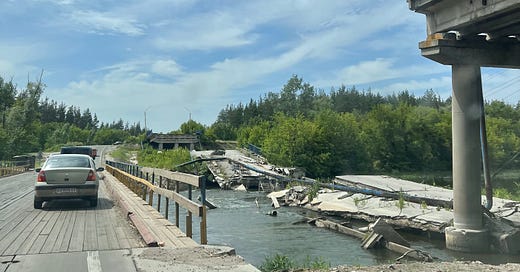



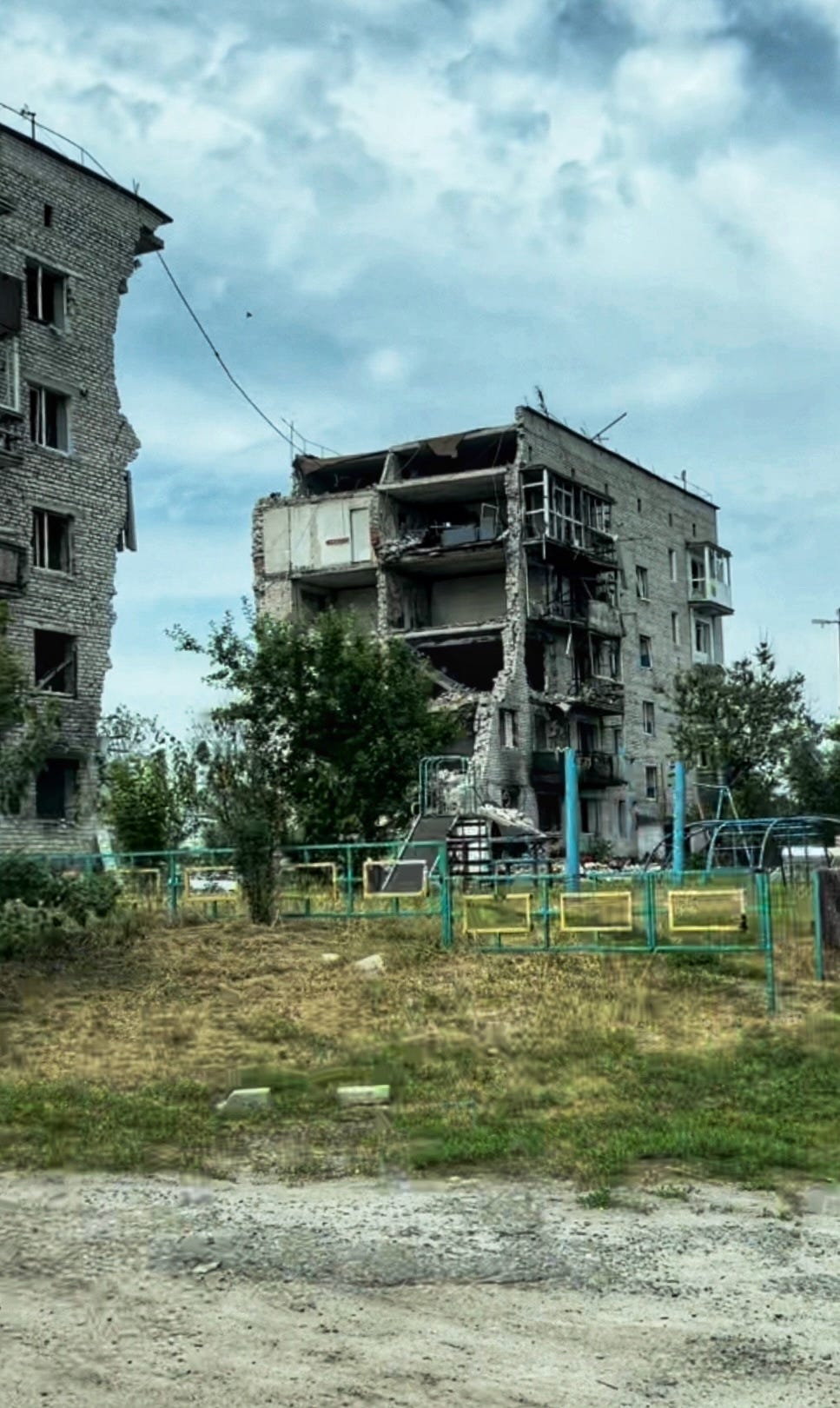
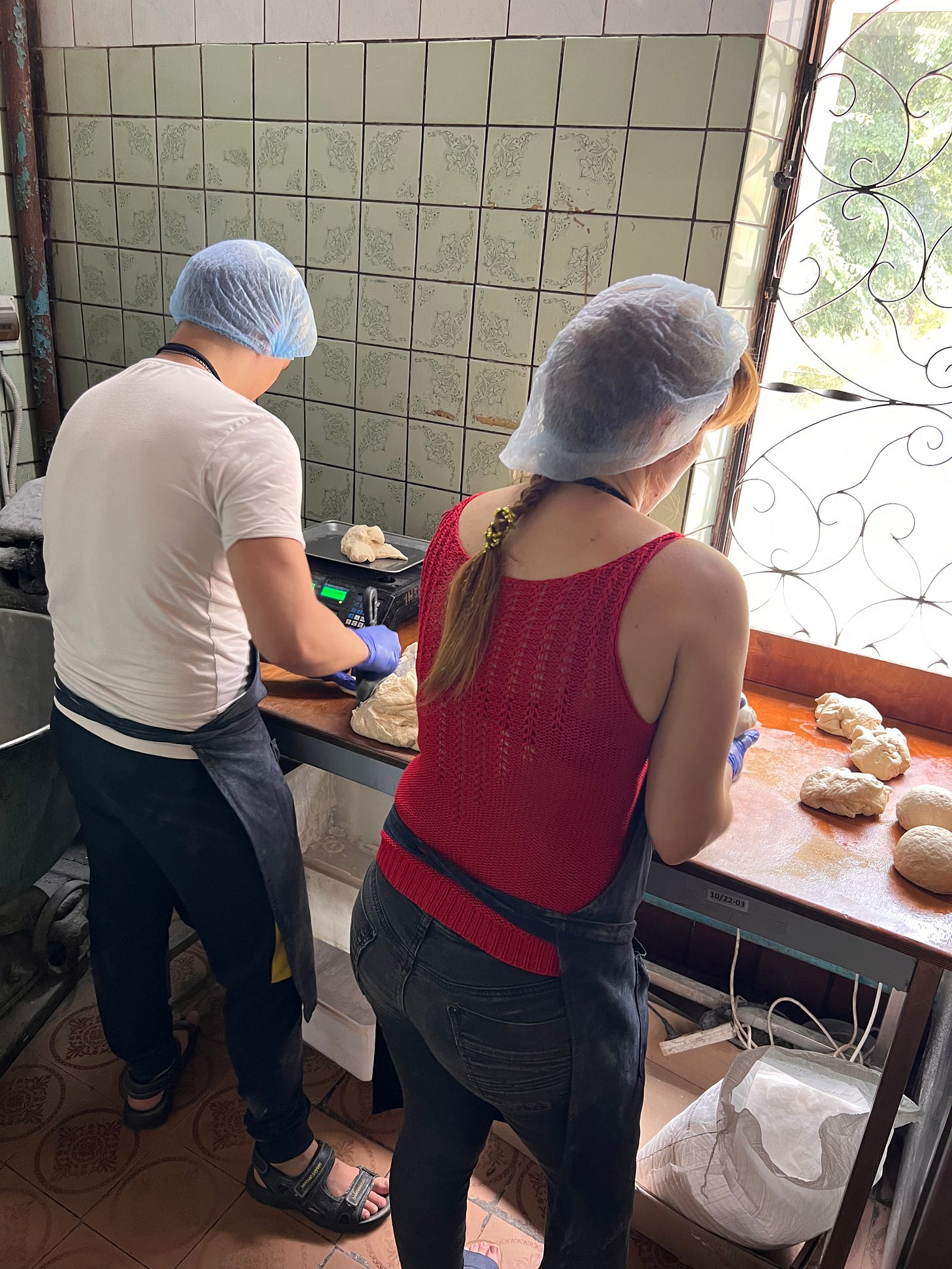

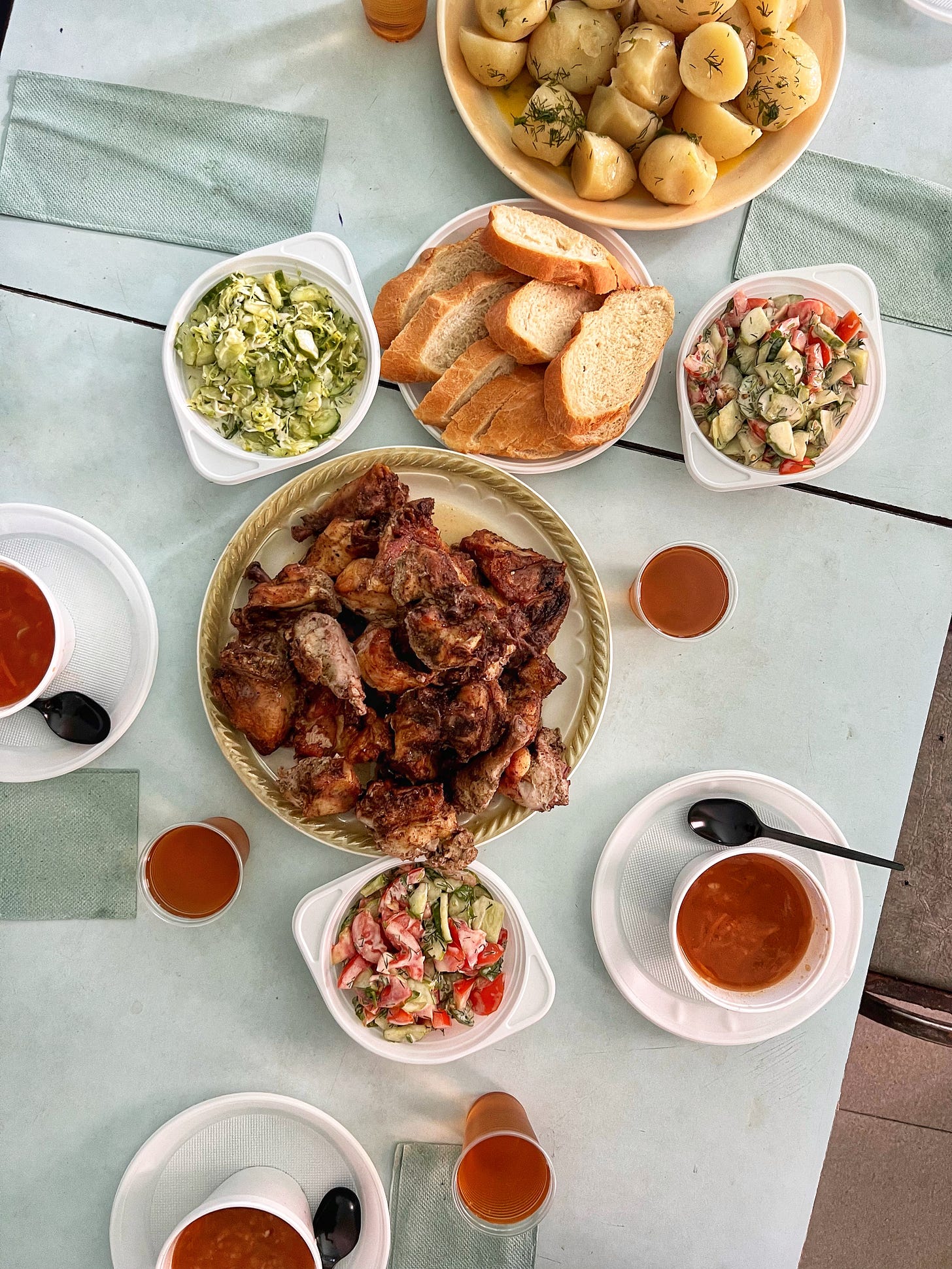


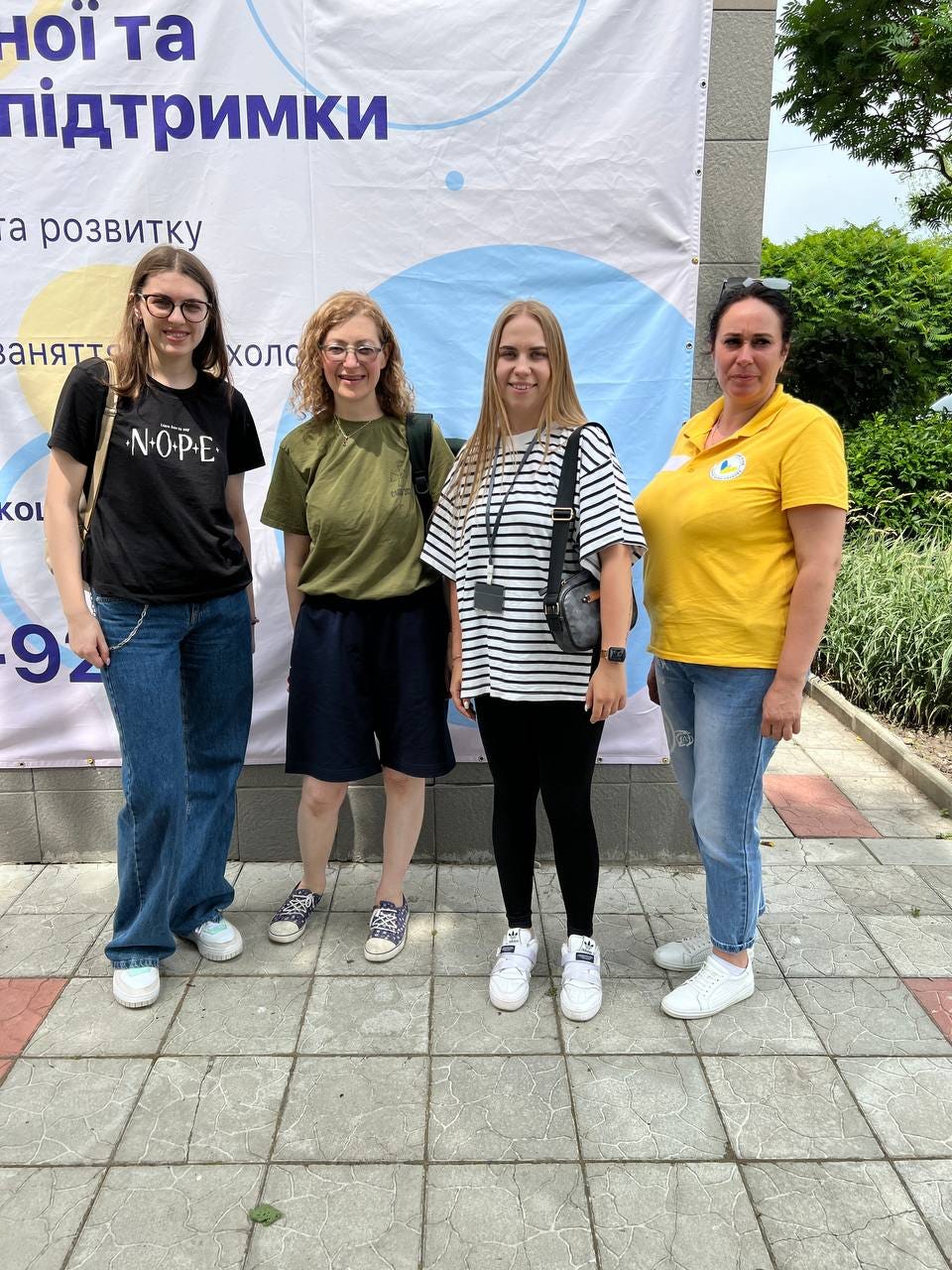
Much love to Izyum ♥️
That children especially need to learn about mines is truly horrifying. Ukrainian people are suffering and will continue to suffer in the aftermath of this appalling invasion. I wonder how long it will take before the Russian people become fully aware of what has been done in their name? The restorative power of the shared table - thank you Felicity.